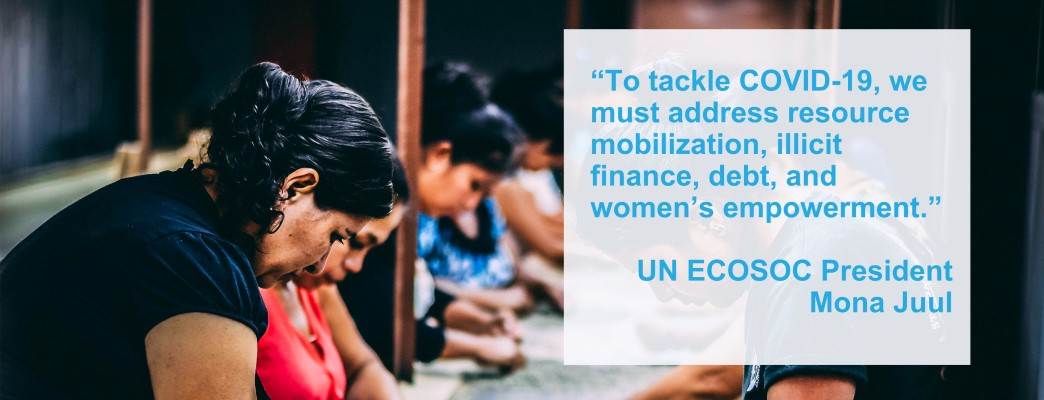Excellencies, Colleagues,
Covid-19 has put at risk our countries and societies. Communities across the globe are hurting.
The pandemic is a painful reminder that financing for sustainable development must be at the centre of our preparedness and resilience.
When I was elected President of ECOSOC last July, I highlighted resource mobilization, illicit finance, debt and women’s empowerment as key issues the Council should address.
9 months on, these priorities are more vital than ever in a vastly different environment.
On debt, I called for concrete actions to address global debt challenges.
Now, as countries race to meet the demands of the crisis response, a viable solution on debt is of vital importance. And I welcome the many options and solutions to the debt issue which have been proposed.
Including the G20 Finance Ministers' Action Plan that calls for debt moratorium for IDA countries, the call by the heads of IMF and the World Bank, and actions by the Paris Club.
I also welcome the call by the Prime Minister of Pakistan for a Global Initiative for Debt Relief to promote a comprehensive solution to the debt issue and financing for sustainable development. And all similar initiatives and proposals.
I am also encouraged by the steps taken over the past weeks calling for other measures aimed at stabilizing the global economy.
I welcome the G-7 Leader’s statement on health care and economic recovery, as well as other important initiatives.
But our efforts must not stop there.
When I was elected as President of ECOSOC, I also called for greater efforts to prevent and combat illicit financial flows.
Against the current backdrop it is clear that all sources of finance must be mobilized to enable countries to address the pandemic and its social and economic consequences.
The integrity of governance is critical for resource mobilisation, public financial management, debt sustainability, and effective service delivery- during and after the pandemic.
Colleagues,
We must also ensure an integrated gender perspective in all our social and economic responses.
Women and men are affected by the pandemic in different ways.
Women disproportionally carry the burden of unpaid care work, and are overrepresented as frontline health workers. It is clear that this is the time also to deliver on our commitment to realise gender equality and women’s empowerment.
Only then can our responses be effective for the whole of society.
Globally, our commitment to achieving the SDGs has not changed, but the urgency to act has.
We must back up our commitments with action.
Action which is responsive to the specific needs of all countries, including: the Least Developed Countries, Land-Locked Developing Countries, Small Island Developing States and Middle Income Countries - to ensure a sustainable recovery from the pandemic for all.
Excellencies,
There is no doubt that the challenges we face as global community can only be overcome through a joint and coordinated response.
This is the time for bold national action, international cooperation, and global solidarity.
The FfD Forum, adapted to the present circumstances, has united the UN membership in this spirit.
For the first time in ECOSOCs history, the UN membership has come together by virtual means to negotiate a unified message.
These efforts underscore our joint commitment to fight the COVID-19 pandemic, to restore sustainable growth, and to put the global economy on a more sustainable path.
The outcome document that was agreed upon this week would be the first universal agreement to finance the immediate response to COVID-19, and
longer-term recovery under the auspices of the United Nations.
A significant achievement.
Let me take this opportunity to thank the trailblazing co-facilitators of the outcome document: the Permanent Representatives of Barbados and Latvia. Who- with hard work and creativity- have done their upmost to make this ambitious endeavour a success.
And I would like to also thank all countries for their vital contributions, and utmost flexibility in these unusual times.
Dear colleagues,
Today’s meeting will not be the end of the conversation on the pandemic and its impact on the 2030 and Addis Agendas in the realm of ECOSOC.
The Council will continue to act as an inclusive platform to mobilize all relevant stakeholders.
Let me assure you that the Economic and Social Council of the United Nations is fully mobilised - through its bodies, experts and partners- to support a strong immediate response, and an inclusive sustainable recovery.
Thank you.
